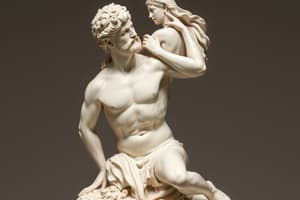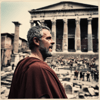Podcast
Questions and Answers
Who is Pygmalion in Greek mythology?
Who is Pygmalion in Greek mythology?
- A king of Cyprus
- A sculptor from Cyprus (correct)
- A famous poet
- The god of love
Aphrodite brought Galatea to life because she was moved by Pygmalion's indifference.
Aphrodite brought Galatea to life because she was moved by Pygmalion's indifference.
False (B)
What themes does the Pygmalion myth explore?
What themes does the Pygmalion myth explore?
Creation, the relationship between artist and artwork, and transformations through love.
Pygmalion's love for Galatea represents unattainable __________.
Pygmalion's love for Galatea represents unattainable __________.
Match the aspects of Pygmalion's story with their meanings:
Match the aspects of Pygmalion's story with their meanings:
Study Notes
Mythological Background
- Origins: Pygmalion is a figure from Greek mythology, a sculptor from Cyprus.
- Story: He fell in love with a statue he carved, which he named Galatea.
- Aphrodite's Intervention: Moved by Pygmalion's devotion, the goddess Aphrodite brought Galatea to life.
- Symbolism: The myth explores themes of creation and the relationship between artist and artwork.
Theme Of Love
- Idealized Love: Pygmalion's love for Galatea represents unattainable perfection and idealization.
- Transformation: The love story illustrates how love can transform both the lover and the beloved.
- Reality vs. Fantasy: Highlights the contrast between the idealized image of love and real-life relationships.
- Reciprocity: Once brought to life, Galatea reciprocates Pygmalion’s love, emphasizing mutual affection.
Mythological Background
- Pygmalion is a sculptor from Cyprus, significant in Greek mythology for his unique love story.
- He created a beautiful statue named Galatea, which he became infatuated with, showcasing the deep connection between creator and creation.
- The goddess Aphrodite, touched by Pygmalion's passion, animated the statue, bringing Galatea to life, symbolizing divine intervention in human desires.
- This myth reflects themes of artistic creation and the complex dynamics of the artist’s relationship with their work.
Theme Of Love
- Pygmalion's love illustrates an idealized form of affection, representing an unattainable standard of perfection.
- Their love story demonstrates transformative power, suggesting that love can lead to significant personal growth for both parties involved.
- The narrative contrasts idealized notions of love with the realities of human relationships, highlighting the gap between fantasy and genuine connection.
- Galatea's reciprocation of Pygmalion's affection underscores the theme of mutual love, emphasizing the importance of reciprocal feelings in a relationship.
Studying That Suits You
Use AI to generate personalized quizzes and flashcards to suit your learning preferences.
Description
Explore the captivating myth of Pygmalion, the sculptor who fell in love with his creation, Galatea. This quiz delves into themes of idealized love, transformation, and the delicate balance between reality and fantasy. Understand how Aphrodite's intervention symbolizes the intersection of artistry and affection.





